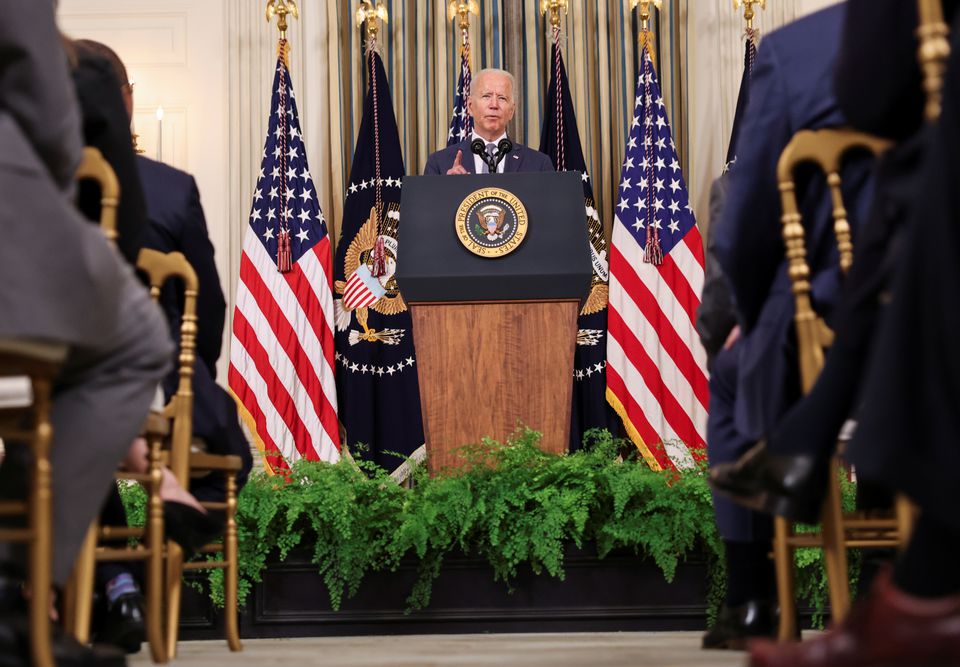美财长:美中首阶段贸易协议伤害美消费者
7/18/2021

美国财长耶伦认为,美中首阶段贸易协议未能解决两国之间的根本性问题,并称该协议和现有的关税措施已对美国消费者造成伤害。
据美国《纽约时报》上周五(16日)报道,耶伦上周接受该报的访问时认为,美国进行对华关税措施的方式并未非常周密(very thoughtful)。
耶伦说:“关税是向消费者征税。在某些情况下,我似乎觉得我们所做的事情伤害到美国消费者,而前任政府经磋商后得出的这种协议,在很多方面并没有真正解决我们与中国的根本性问题。”
据彭博社报道,美国拜登政府需要决定,是否要保留或取消这项协议,还是制定新协议以取代首阶段贸易协议。
前中国常驻联合国日内瓦代表团副代表周小明上周五在“中美聚焦”网站发表英文文章,评论协议下来的方向时说:“贸易方面目前相对平静,但这似乎不能预示着美好的时光将到来,预料将出现的是雷雨交加的日子。”
Biden signs order to tackle corporate abuses across U.S. economy
By: Nandita Bose, Jarrett Renshaw, Diane Bartz
7/11/2021
President Joe Biden signed a sweeping executive order on Friday to promote more competition in the U.S. economy, urging agencies to crack down on anti-competitive practices in sectors from agriculture to drugs and labor.
If fully implemented, the effort will help lower Americans’ internet costs, allow for airline baggage fee refunds for delayed luggage, among other steps.
The order instructs antitrust agencies to focus on labor, healthcare, technology and agriculture as they address a laundry list of issues that have irritated consumers, and in the case of drug prices, has bankrupted some.
“No more tolerance of abusive actions by monopolies. No more bad mergers that lead to massive layoffs, higher prices and fewer options for workers and consumers alike,” Biden said at a White House signing ceremony.
The president noted areas where advocates feel that prices are too high, wages are tamped down or new businesses excluded from competition. “Let me be very clear, capitalism without competition isn’t capitalism, it’s exploitation,” he said.
The White House says the rate of new business formation has fallen by almost 50% since the 1970s as large businesses make it harder for Americans with good ideas to break into markets.
Biden’s action goes after corporate monopolies across a broad swath of industries, and includes 72 initiatives he wants more than a dozen federal agencies to act on.
Lower wages caused by lack of competition are estimated to cost the median American household $5,000 per year, according to a White House fact sheet that cites research from the American Economic Liberties Project – an influential Washington-based anti-monopoly group.
The initiatives will no doubt kick off a series of fights with the affected industries.
The powerful U.S. Chamber of Commerce issued a statement saying the move “smacks of a ‘government knows best’ approach to managing the economy” and pledged to “vigorously oppose calls for government-set prices, onerous and legally questionable rulemakings, efforts to treat innovative industries as public utilities, and the politicization of antitrust enforcement.”

Among the administration’s plans to open up the U.S. economy are new rules to mandate ending excessive internet contract termination fees, allow hearing aids to be sold over the counter and end non-compete clauses for millions of workers and many occupational licensing requirements.
Biden’s order pushes the Agriculture Department to act to stop what the White House called “abusive practices of some meat processors,” reacting to farmers and ranchers who sometimes say they face too few buyers for their animals.
The administration also seeks to make it easier for customers to switch banks and take their transaction data with them, and restore net neutrality rules that require companies to treat all internet services equally.
Reuters first reported Biden’s plan to issue a competition executive order in late June and subsequently published stories on how it will impact industries such as farm equipment manufacturers, banking, rail and sea shipping.
The executive order will direct the Department of Justice and Federal Trade Commission (FTC) to carefully review mergers, and to challenge prior deals that have closed.
It directs the FTC to issue rules to address competition concerns from Big Tech companies, Facebook, Apple, Alphabet’s Google and Amazon, and limit “killer acquisitions” where large internet platforms acquire potential competitors.
FTC Chair Lina Khan and the acting head of the U.S. Justice Department Antitrust Division, Richard Powers, said Friday that they would soon launch a review of merger guidelines to determine if they are “overly permissive.”
On prescription drugs, it aims to lower prices for consumers by allowing importation of drugs from Canada, where they are cheaper. It also urges the Department of Health and Human Services to draw up a plan to fight high drug prices, and gouging.
Evercore/ISI analyst Michael Newshel said in a research note that the impact of allowing imports from Canada on pricing would be limited given Canada’s limited drug supply and that Canada has indicated in the past that it would not cooperate with any program. He said the government’s decision to turn to executive orders on drug pricing was surprising given ongoing legislative efforts in Congress.
The executive order also establishes a White House Competition Council, led by the Director of the National Economic Council and including many cabinet secretaries, to monitor progress.
美CDC延长“禁驱令” 纾困金申请差异大 有房东开始抛售
东森新闻
4/10/2021
美国联邦政府疾病控制与预防中心(CDC)先前下令延长禁驱令,使房客能够应疫情影响延迟缴交房租的情况下,不至被房东赶出家门。然而这项命令对小型或个人房东的影响严重,因为他们无法直接从疫情纾困基金中取得金援,部分承受不住的已经选择抛售房产以弥补损失。
根据美媒“CNBC”报导,拜登政府上任后的国会此次规划的大规模疫情纾困案中,将500亿美元拨给租房纾困,但核发的资格认定并非由联邦政府决定,而是由各州政府甚至下至各市镇地方政府管辖。
报导指出,核发资格中规定任一笔纾困金的申请,必须由租客和房东共同提出,租客必须正式宣告目前经济状况无法缴交房租,后由政府拨款经过房东以取得纾困金,房东不得自行申请;然而部分地区的房东能够协助租客申请,部分地区则不行,后续衍生的问题便开始出现。
疫情去年3月在美国爆发至今已逾1年,时间拉长对经济负担愈形加重,全国公寓协会总裁兼CEO皮那加(Robert Pinnegar)便指出,“如果你在的地区政府允许你以房地产拥有人的角色,协助你的租客尽快申请纾困金,那你就更能够成功拿到钱。如果你在的地区,政府服务并不是那么的‘顾客友善’的话,就会花上更多时间。”
这样的情况使得部分小房东难以负荷,全美目前有超过半数的房地产是由小型公司或个人所持有,当中又过半数人的房客因为疫情已经欠缴房租,而在这之中又有超过3分之1的人,为了缴交房贷或维持自己的房产与物业,甚至必须用上自己的储蓄,或是申请再融资,盼望能熬过这波收入低谷。直到承担不住时,只好选择抛售,而这正是目前一部分人已经走到的地步。

Some landlords sell properties as CDC extends eviction ban
By Diana Olick
4/10/2021
KEY POINTS
- A federal ban on evictions is putting the squeeze on smaller landlords, who are unable to directly access Covid rental relief funds, and some are starting to sell properties to recoup some losses.
- This will likely reduce the much-needed, affordable rental stock in an already unaffordable housing market.
- The Centers for Disease Control and Prevention on Monday extended the eviction ban until the end of June.
A federal ban on evictions is putting the squeeze on smaller landlords, who are unable to directly access Covid rental relief funds, and some are starting to sell properties to recoup losses.
This will likely reduce the much-needed, affordable rental stock in an already unaffordable housing market.
Covid relief bills out of Congress have earmarked over $50 billion to go toward rent relief. But the requirements vary depending on state and even local jurisdictions.
Any application for relief must involve both the tenant and the landlord. Tenants must formally declare that they are unable to make payment in order to get the government money, which is then funneled through to landlords. Landlords cannot request it alone. In some areas, they can help their tenants with the process, but in others they may not.
“So if you happen to be in a jurisdiction that allows you as the property owner to work on behalf of your resident, to be an advocate, to get those funds into their hands as quickly as possible, then you’re going to be much more successful,” said Robert Pinnegar, president and CEO of the National Apartment Association. “If you’re in jurisdictions that have taken an approach that is not so customer service friendly, then it’s going to take longer.”
The Centers for Disease Control and Prevention on Monday extended the eviction ban until the end of June, as the Biden administration proceeds with the next phase of its plan to stamp out the coronavirus.
The program is intended to keep renters safe. Yet while large multifamily rental companies can offer concessions and weather some missed payments, smaller landlords often cannot.
Sixty percent of single-family rental homeowners who are owed back rent received the necessary paperwork from their tenants, as required by the CDC, to receive the relief money, according to the National Rental Home Council.
With so many still waiting for relief, however, about a third of landlords said they will be forced to tighten standards when evaluating future rental applications, and 11% said they have already been forced to sell at least one of their properties.
In the current housing market, which is seeing very high demand and a record low number of homes for sale, homes listed by landlords will likely sell to owner occupants and evaporate from the rental housing stock. The pandemic-induced run on housing in the past year has caused the amount of rental stock to decrease by over a quarter of a million units. Rental housing is generally more affordable than ownership.
“The thing that keeps me up at night is we had a housing affordability crisis going into Covid-19,” said Pinnegar. “If we lose that critical naturally occurring, affordable housing that is out there across this country, we’re going to have a catastrophe on the other side of this.”
Marilyn Blackburn, a landlord in Washington state for 20 years, has decided to sell her nine rental properties as soon as she can.

Zach Caby | CNBC
“It’s been six months with these tenants and we’ve lost, I think I’m out about $12,000 so far just in the rents,” said Blackburn. “And you know they don’t allow us to collect late fees either, so there’s a couple of thousand [dollars] in late fees as well. And again, you still have to keep paying the mortgage every month.”
Blackburn said the tenants who are not paying are refusing to respond to her. If they don’t file the paperwork for the relief, she gets nothing.
“It’s just frustrating. You know people are living in my house, taking advantage of me, and there’s nothing I can do about it,” she said.
A Census survey this month found 15% of renter households, or 6.7 million, said they were behind on their rent. Additionally, nearly 27%, or 11.8 million households, have slight or no confidence in their ability to pay next month’s rent. Some estimates are that close to $60 billion in back rents and fees are owed since the pandemic began.
“You get to a point where you get that far behind that you just, the world begins to cave in on you and you don’t have the desire to try to go through a process that is very difficult and complex to get the assistance that you need,” said Pinnegar.
More than half the rental stock in the nation is owned by smaller landlords, and more than half of those landlords have tenants who have missed payments during the pandemic, according to a new survey from the NRHC. Of those, more than one-third said they have had to dip into personal savings or take out a loan to make payments for mortgages and maintenance on their properties.
“The financial difficulties encountered by rental home property owners over the past year have created real uncertainty concerning the direction of the rental housing market, uncertainty that has only been exacerbated by myriad local, state, and federal eviction moratoria,” said David Howard, executive director of NRHC. “While rental assistance programs will certainly help, for many property owners it may be too late.”
Steffen Landrum owns several rental properties in Massachusetts. He said he finished 2020 with a more than $10,000 deficit in owed rent, three of four properties in forbearance and $6,500 in utility payment arrears.
“Despite this I think that I’m lucky to be holding on. This is mostly due to a few reliable residential tenants and my business tenants,” said Landrum. “Unfortunately, I may have to hit the reset button and sell one if not two properties before this is all over with.”
— CNBC’s Lisa Rizzolo contributed to this report.
Source: https://www.cnbc.com/2021/03/29/covid-eviction-ban-forces-some-landlords-to-sell-properties.html
Small Landlords Say They Face Financial Struggles Due To Eviction Moratorium
By JOLENE ALMENDAREZ
4/10/2021

BILL RINEHART / WVXU
The CDC recently extended its eviction moratorium until the end of March to keep people in their homes during the deadly COVID-19 pandemic. At a time when up to 40 million people across the country are at-risk of being evicted, the protections in place are a welcome relief for some. But for small landlords who don’t have much of a financial cushion, the moratorium could be disastrous.
Martin Walker is a 57-year-old Cincinnati man. He rents eight units in two homes. Many who know him would describe him as being a cool guy. He’s lived on-and-off for decades in Over-the Rhine. Before COVID, he and his wife Takako Tsubohara used to go to the symphony Downtown. He collects 16 millimeter films and is the president of a local tobacco pipe club.
“We all we enjoy smoking pipes, and all the pipe tobacco and just all the paraphernalia and the different blends of tobacco and the different pipe manufacturers,” he said.
Everyone in the club has a nickname. They call him Mr. President.
Walker and his wife both work full time at Toyota. He bought one building about 17 years ago and the other about a decade ago. He renovated them, figuring they’d be good retirement investments.
But the pandemic has changed that.
Walker says he initially let his tenants miss a few payments, especially the ones in the service industry, figuring they could make it up to him over the next year. But one of them, a bartender, couldn’t make any payments and eventually moved out after not paying rent for roughly five months.
“He ended up owing me like $5,000 or something. And, you know, for a small guy like me, that’s a lot — I got to pay property taxes and mortgages and utilities and all that sort of thing. So it’s been painful,” he said.
In addition to the bartender, another tenant moved out. It’s the first time Walker has had long-term vacancies in his apartments.

He’s had to lower rent in apartments to try to get them occupied. He planned to retire last May, but had to push that off for another year or two. And he’s thinking about selling a small house he and his wife own in Sylvania, about three hours away.
But Walker still considers himself lucky. Since he and his wife work full-time, they’re not forced to sell or foreclose.
Just under half of all landlords in the country are considered these type of mom-and-pop landlords, meaning they only own a few units. And while the government allocated tax breaks and trillions of dollars for landlords in the CARES Act, small landlords were mostly left out to qualify for those.
That has a real impact.
The National Consumer Law Center says roughly 5% of homeowners will have significantly delinquent mortgages soon and may be forced to foreclose on their homes.
Kevin Brewer is a local attorney who represents landlords. He doesn’t represent Walker but confirmed that the struggles landlords are facing because of the moratorium are real.
“You can imagine, if you’re a small landlord, what kind of financial situation that could put a landlord in,” he said. “As I mentioned, they might put off doing repairs, they might not be able to make their own mortgage payments, which could lead to foreclosure.”
But that’s just one perspective. Mark Lawson, president and CEO at the Cincinnati-Hamilton County Community Action Agency, reminds people rental assistance is landlord assistance.
“I think from a policy perspective, we’re helping the landlords. Not necessarily their mortgage payments, but if we get everybody, all their tenants to be able to pay the rent, and get caught up … because for the Ohio Home Relief grant money, there’s no cap on how much assistance we could get,” he said. “So you know, we could pay back all the way until April 1. So that is huge for tenants and huge for landlords.”
The CAA doles out rental assistance in Cincinnati. Lawson says so many people have applied for help, there’s about a 2,000-person backlog and not enough workers to quickly get through applications. There’s still millions of dollars left on the table right now for rental and utility assistance.
“So there’s plenty of assistance out there. And so that coupled with the idea of 2,000 people in our pipeline, to me, that means let’s not evict somebody while they’re waiting just to get in line with us,” he said.
Lawson says the organization has spent a little more than $5 million on rental and utility assistance and still has about $11 million dollars left to help people.
Rental assistance information can be found at the CAA website.








